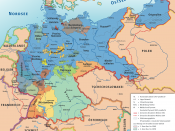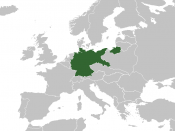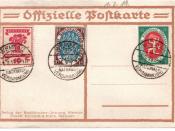It would be wrong for the Weimar Republic to be deemed a total failure. Although the Republic did fail in its attempt to maintain a democratic government when the Nazi's came to power in 1933, it cannot be forgotten that the republic instilled a period of relative stability from 1924 to 1929. During this time the Weimar Republic was able to stabilise the economy, politics and international relations and it entered Germany into the League of Nations. There were a number of reasons both political and economical as to why the Weimar Republic failed in 1933. The Weimar constitution had a flaw which was Article 48 which could be abused by the head of state, this along with the 'system of proportionate representation', the death of Stresemann and the political prowess of Hitler led to the downfall of the Weimar Republic. Also economical factors such as reparations, hyperinflation and the great depression had a considerable impact on the Republic and the people's opinion towards the Republic.
The Weimar Republic was able to guide Germany through the initial years of chaos after the end of the war and from 1924 to 1929 Germany was relatively stable. The Republic had combated the crisis hyperinflation had created, and while still battling with reparations, Germany was once again economically stable. However as Germany would soon find out with the onset of the depression, this economic stability was built on false grounds as Germany had used short-term loans to fund long-term investments.
Germany was fairly politically stable in the years from 1924 to 1929; the coalition of the democratic parties held a majority in the Reichstag in 1924 and was able to maintain this in the 1928 election. Field Marshal Paul von Hindenburg had been appointed President in 1925 and he was a popular choice.



Republic
Seems like a very good paper alot a lot of good research.
2 out of 2 people found this comment useful.